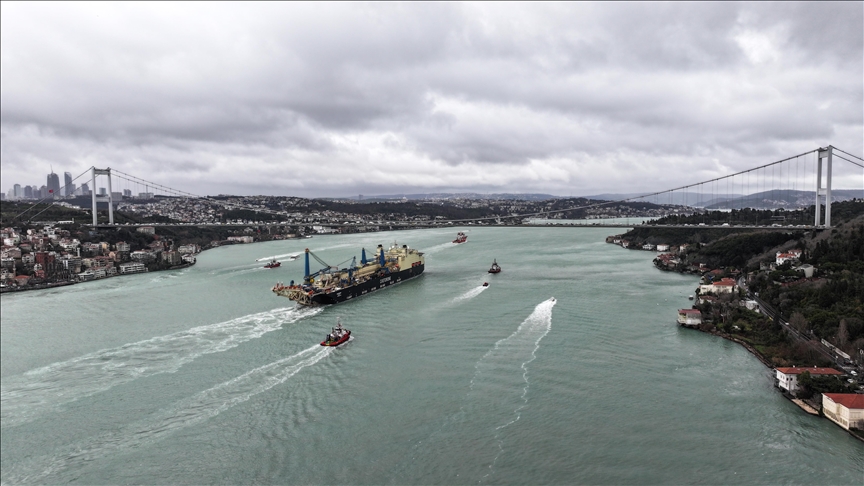
Istanbul
- Türkiye’s entrepreneurial approach to foreign policy has elevated its regional presence, and energy diplomacy is increasingly central to this strategy. High-level visits often include the energy minister alongside the foreign minister
-The author is an energy studies researcher at the Foundation for Political, Economic and Social Research (SETA) based in Turkish capital Ankara.
ISTANBUL
Energy remains one of the most vital pillars of sustainable economic growth. Just as a century ago—when fossil fuels (oil, coal, and natural gas) dominated the global energy mix—today the rapid proliferation of clean energy technologies, the growing demand for critical minerals, and the strategic importance of rare earth elements continue to place energy at the forefront of contemporary foreign policy agendas. The interdependence of global markets has, in turn, compelled both energy exporters and importers to adopt a more cautious and calculated approach to international relations.
Türkiye’s energy consumption has grown steadily with its population and economy, and it has outpaced many peers in diversifying its energy mix. For over two decades, Ankara has leveraged its unique geography and deep-rooted historical ties to pursue a proactive and multidimensional energy diplomacy policy. By diversifying not only the types of energy it consumes but also the transit routes through which it imports them, Türkiye has gradually reshaped what was once an “asymmetric dependency” on hydrocarbon-rich neighbors into a framework of “mutual interdependence.” Strategic investments in natural gas infrastructure—ranging from pipeline networks to LNG import capacity—have strengthened Türkiye’s energy security. Its two LNG regasification facilities and three floating storage and regasification units (FSRUs) have also bolstered Türkiye’s negotiating power in gas import agreements.
Beyond mere import diversification, Türkiye aspires to reduce its external dependence by transforming itself into a producer as well as a consumer. Over the past decade, Ankara has launched ambitious efforts to conduct hydrocarbon exploration both on land and offshore within its maritime jurisdiction—backed by a deep-sea exploration and drilling fleet that places it among a select group of nations with such capabilities. Importantly, this fleet is not intended solely for domestic use. Türkiye aims to contribute to the energy security of its broader neighborhood, positioning itself as a regional power with global ambitions in energy.
The rising role of energy in foreign affairs
Türkiye’s entrepreneurial approach to foreign policy has elevated its regional presence, and energy diplomacy is increasingly central to this strategy. High-level visits and summits often include the energy and natural resources minister alongside the foreign minister—a symbolic yet significant indicator of energy’s growing prominence within Ankara’s diplomatic engagements.
Through state partnerships and direct involvement of its national oil company, Turkish Petroleum (TPAO), Türkiye has become an active participant in hydrocarbon ventures abroad. From Azerbaijan and Russia to Iraq and Afghanistan, Ankara has engaged in exploration and production activities. Most recently, Türkiye initiated seismic studies in Somalia’s maritime zones to identify potential hydrocarbon reserves. In April, Türkiye and Somalia signed an agreement enabling TPAO to operate onshore as well—a development that not only underscores mutual trust but also deepens bilateral ties. This model of cooperation could well be replicated across the Horn of Africa and beyond.
Türkiye’s expanding energy activism
Türkiye’s partnership with Somalia is not an isolated case. For several years, Ankara has maintained a robust diplomatic tempo aimed at expanding its energy cooperation with other friendly and allied nations. A case in point is the 2019 maritime boundary agreement with Libya, which includes provisions for Turkish hydrocarbon exploration within Libya’s territorial waters—an agreement still awaiting full implementation. These efforts extend well beyond Africa. In 2024 alone, Türkiye held strategic dialogues and signed energy-related agreements with Venezuela (a global oil giant), Niger (an emerging LNG exporter), Algeria (a long-standing energy partner), China (the largest energy consumer and technology producer), and the US (the top hydrocarbon producer).
The first five months of 2025 have already seen a flurry of energy diplomacy. A recent agreement with the US on developing unconventional oil and gas reserves reaffirms Türkiye’s commitment to reducing its hydrocarbon dependence. Separate agreements signed with Hungary and Pakistan enable TPAO to conduct exploration and production operations abroad, further cementing Türkiye’s credibility and expertise in the sector.
Meanwhile, a deal to lease one of Türkiye’s FSRUs to Egypt—historically a source of LNG imports—illustrates Ankara’s willingness to deploy its critical infrastructure to support the energy security of its allies. This move reinforces the narrative that energy, when harnessed wisely, can serve as a bridge between nations.
Summits as instruments of energy diplomacy
In parallel with diplomatic outreach, Türkiye has established itself as a convening power for energy dialogue. The Istanbul Energy Forum, held in November under the banner “An Energy-Independent Türkiye,” brought together energy and natural resource ministers from Russia, Azerbaijan, Bulgaria, Georgia, Hungary, Libya, Moldova, Serbia, and Uzbekistan. Executives from SOCAR, Azerbaijan’s national energy company, and Oman LNG also participated. The forum produced commitments for cooperation across multiple domains, from hydrocarbons and renewables to mining and nuclear energy.
More recently, the Istanbul Natural Resources Summit—held in May under the theme “Securing Resources, Rebuilding the Future”—convened ministers from numerous countries. In the first ministerial session, Turkish Energy Minister Alparslan Bayraktar discussed mineral security in the energy transition with counterparts from Hungary, Somalia, Niger, Libya, and Saudi Arabia. The second session brought together ministers from Libya, Romania, Iraq, Azerbaijan, Syria, Bulgaria, and Moldova to deliberate on energy security amid emerging global risks. Multiple bilateral agreements signed during the summit reaffirmed Türkiye’s growing status as a central actor in global energy governance.
Türkiye’s recent strides in energy diplomacy not only secure its national interests but also position it as a regional stabilizer and a global partner. In a world increasingly defined by energy transitions and geopolitical uncertainty, Ankara’s energy activism offers a compelling model of strategic engagement, technological readiness, and cooperative leadership.
*Opinions expressed in this article are the author's own and do not necessarily reflect Anadolu's editorial policy.



